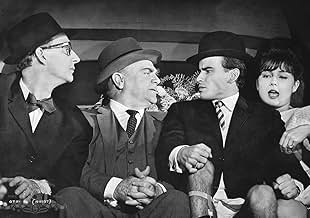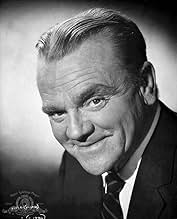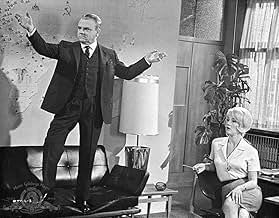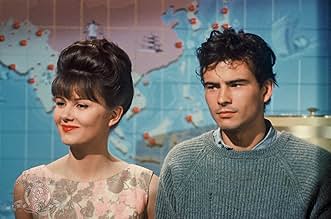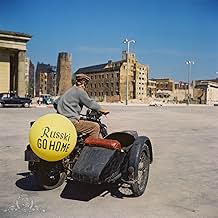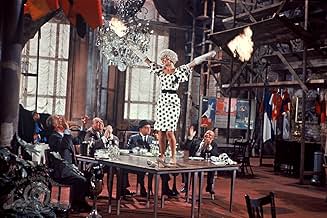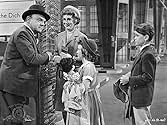A Berlino Ovest durante la Guerra Fredda, un dirigente della Coca-Cola ha il compito di prendersi cura della figlia del suo capo.A Berlino Ovest durante la Guerra Fredda, un dirigente della Coca-Cola ha il compito di prendersi cura della figlia del suo capo.A Berlino Ovest durante la Guerra Fredda, un dirigente della Coca-Cola ha il compito di prendersi cura della figlia del suo capo.
- Regia
- Sceneggiatura
- Star
- Candidato a 1 Oscar
- 1 vittoria e 8 candidature totali
- Fräulein Ingeborg
- (as Lilo Pulver)
- Melanie Hazeltine
- (as Lois Bolton)
- Krause
- (voce)
- …
- Cindy MacNamara
- (non citato nei titoli originali)
Recensioni in evidenza
From the time you hear the first few bars of "The Sabre Dance" thru the final shot of James Cagney, you are on a constant roller coaster, and you don't want to get off. It is a manic, wild movie that never disappoints or lets down.
The engine that drives this lunacy is James Cagney. In one of his best, funniest and energetic performances, he is nothing short of amazing. He is a whirling dervish, at the heart of a storm that he has no control over. I don't want to give any of the story away, suffice to say that he is nothing short of spectacular. In Cameron Crowe's book on Billy Wilder, Wilder laments that Cagney was so loud and energetic at the start of the film, that his character really has nowhere to go, in terms of building, and reacting to the chaos. I would agree with that assessment, but Cagney's performance does not let the audience stop and catch it's breath long enough for this to really be a factor.
Wilder and Diamond have brought us another gem. Is there another writing team that within a span of three years, have created three better pictures than the ones they have given us (Some Like It Hot, The Apartment, One,Two,Three)? I doubt it.
Kudos all around to the supporting cast as well. Especially, Arlene Francis, as Cagney's wife, and Lilo Pulver as his secretary. Also watch for some "inside" jokes. Like when Cagney threatens Horst Buchholz with a grapefruit, and Red Buttons, in a cameo, doing a Cagney imitation.
Great fun from start to finish. 10/10
The talk is fast-paced. The humor is broad and full of Wilder wordplay. Cagney is an unrelenting engine. He is buzzing with energy and I half-expected him to explode in song and dance. The machine gun dialog is non-stop and can get tiring at some point. This is a feat of performance from the great Cagney.
Billy Wilder's "One Two Three" is one of the greatest comedy films ever made. This wonderfully zany 1961 gem is a lightning-paced, hysterical farce (and with it's classic instrumental theme of "The Sabre Dance," you know you're in for a rollicking, rapid-fire comedy). Based on a French play, much of the movie plays out like a stage comedy, as Wilder simply turns his camera on the actors and lets them do their thing. The entire cast is simply superb, their comic timing perfect. James Cagney gives one of his all-time greatest performances as C.R. MacNamara. In almost every scene, with the bulk of the script on his shoulders, Cagney is sharp, quick on the draw, and just plain hilarious as the bewildered executive. Arlene Francis lends fine comic support as Cagney's sarcastic wife, Horst Buchholz is very funny & perfectly cast as the rebellious Otto, and the gorgeous Pamela Tiffin is simply a riot as the hot-blodded, dim-witted Scarlett. But ALL the actors in this movie are funny & terrific. Billy Wilder's direction is marvelous, and his script co-written with I.A.L. Diamond is clever and hilarious.
Some may find the quick pace of "One Two Three" a little exhausting, as the movie's energy level remains high from beginning to end, rarely stopping for air, but it works for me. This movie is pure farce, plain and simple. It makes no apologies for what it is, and it's goal is to make you laugh loudly. "One Two Three" is one of the most hysterical movies I've ever seen in my life, and it never fails to give me bellylaughs. Thank you Billy, Jimmy, and all the rest for this magnificent comedy gem.
But it was shown (letterboxed - "The only way to fly!") on Turner Classic Movies the other night and I quite enjoyed it, since it may now be enhanced somewhat at today's distant remove from the politics and the contemporary references of its period.
Cagney's performance is really amazing and it's not so surprising that this was his last major film role on the big screen. He must have been exhausted when filming wrapped!
The rest of the cast seems to be thoroughly in the service of what Wilder intended, which certainly wasn't subtlety, to say the least. And the production values and behind-the-scenes contributions (especially Andre Previn's witty score) are Class "A" all the way (except for that flat-looking studio mock-up of the air terminal interior, apparently necessitated by problems that couldn't have been foreseen).
It's not Wilder's best but it's a cut above (and then some) so much of the stuff that passes for comedy on the multiplex screens today.
But for a dessert, it's still 'rich' enough to be enjoyed with its machine-gun dialogues worthy of Hawks and Cukor' classics that makes you wonder if you didn't accidentally fast-forward the film at 1.5 speed. And there is such vaudevillian streak of incongruous events and improbable coincidence that it provides the right canvas for safe hilarity, in other words so many things happen in the film that even the lousiest gag doesn't have time to fall flat, another comes at the rescue. And as Coca-Cola executive McNamara, James Cagney delivers a painstakingly energetic performance that exhausted him so much he retired from acting for 20 years until his cameo in "Ragtime", that's how demanding his role was... and you can feel it in the screen.
Cagney didn't get along with Horst Bucholz who plays Otto the young idealist communist who marries the Coca Cola's top man's daughter (Pamela Tiffin) and wished he could kick his ass to calm down his scene-stealing impulses. These incidences reminded me of Fonda not getting along with Ford during the shooting of "Mister Roberts", starring Cagney as well, but that didn't affect the film since it's all meant to be a big joke and in the scenery-chewing contest, Cagney and Bucholz are equally hammy and funny if you look at the film with indulgent eyes. Maybe Cagney was too old and Jack Lemmon would have been a more fitting choice as a middle-aged executive in one of the most emblematic American brands. We'll never know.
The real problem in "One, Two, Three" is that it starts brilliantly, the whole first act where we see "Mac" handling Germans' manners and double-edged efficiency draws a pattern of cultural clashes' gags that found an echo in both the Cold War context and the difference of mentalities between America and the European world, as if there was a second curtain behind the infamous iron one (though much lighter). But even if if the non-existence of the Berlin wall (only mentioned at the beginning) dates the film, made ironically the exact year of its building, the film also managed to be ahead of its time prophesizing the missiles crisis with a Russian executive saying about Cuban, "they give us cigars, we give them missiles".
The dialogues with the Soviet representatives are nothing short of brilliant writing, reminding us of the wit that Wilder displayed when he wrote "Ninothcka", a film whose comedic efficiency also depend on a funny Soviet trio. The comment about the Swiss cheese being rejected because it had holes had me in tears, to name that one. The plot thickens to the point of convolution when it adds the romantic subplot but it makes up for the blandness of the two lovers (no matter how colorful they're made to be) when it adds another dimension of cultural shift between Southerners and Yankees, the flimsy Southern belle didn't realize the political meaning of "Yankee, go home" slogan nor what a house "with a short walk to the bathroom" implied.
But the best asset the film has to offer is its slice of life from both sides of the Iron curtain or the soon-to-be Berlin wall. For all the antagonism directed against US capitalism, there might be one thing no one can resist which is a bottle of Coca-Cola, the brand that perhaps sold the American dream more than any political operation. So watching Cagney playing diplomacy with the Russian provided the film's best moments culminating with that unforgettable Sabre Dance and barefeet Fraulein Ingebörg frenetically shaking her voluptuous body on a restaurant table in front of executives getting an exciting taste of the Western dream. That musical sequence might be one of my favorite from any Wilder films and it's crucially set at mid-point just when the plot started to drag.
As I said, Horst Bucholz was hammy only to the degree that it was the only possible way to go the distance with Cagney and I enjoyed watching the lovable Arlene Francis playing his resigned but not discouraged wife. Yet the film is so busy providing one liners right after another that it takes the safe side and injects lousy wedding-and-divorce segments where so much could have been done in the area of politics. But maybe Wilder was getting too old-fashioned leaving sharper tones to a certain Cold-War comedy directed by Stanley Kubrick, interestingly a movie that also pays a tribute to Coca Cola through one of its most memorable scenes. That level of wit is missing in the film already dated by its own context. One thing to its defense though, it offers the perfect response to Joan Crawford's complain of product placement and the perfect punchline with Pepsi Cola having the last word.
And to give a last word, if the film isn't in the same league that "Some Like it Hot" and "The Apartment" and marks the decline of Wilder's prestige and awards pretensions, it still works and maybe it does so because somewhere I could feel it didn't pretend to be anything but a farce and comedy of manners with the Cold War as the backdrop. A "Dr. Strangelove" it isn't but either you don't find it funny or you do. I did find it funny many times and brilliant in a few scenes.
Lo sapevi?
- QuizThe film recorded a loss of $1.6 million. It didn't do well at either the U.S. or German box office because the story felt much more sinister in 1961 when the Berlin Wall was erected.
- BlooperSchlemmer calls his former superior officer in the SS "Herr Oberleutnant". The SS had no rank of Oberleutnant nor did its members call each other Herr. Oberleutnant was a German Army rank. The corresponding SS rank was Obersturmführer. In the German (dubbed) version, Schlemmer correctly addresses him as "Obersturmführer".
- Citazioni
Borodenko: When will papers be ready?
C.R. Macnamara: I'll put my secretary right to work on it.
Mishkin: Your secretary? She's that blonde lady?
C.R. Macnamara: That's the one.
Peripetchikoff: [after conferring with the others] You will send papers to East Berlin with blonde lady in triplicate.
C.R. Macnamara: You want the papers in triplicate, or the blonde in triplicate?
Peripetchikoff: See what you can do.
- ConnessioniEdited into Grand format: Amérique, notre histoire (2006)
I più visti
Dettagli
Botteghino
- Budget
- 3.000.000 USD (previsto)
- Lordo in tutto il mondo
- 146 USD
- Tempo di esecuzione
- 1h 44min(104 min)
- Colore
- Proporzioni
- 2.35 : 1


